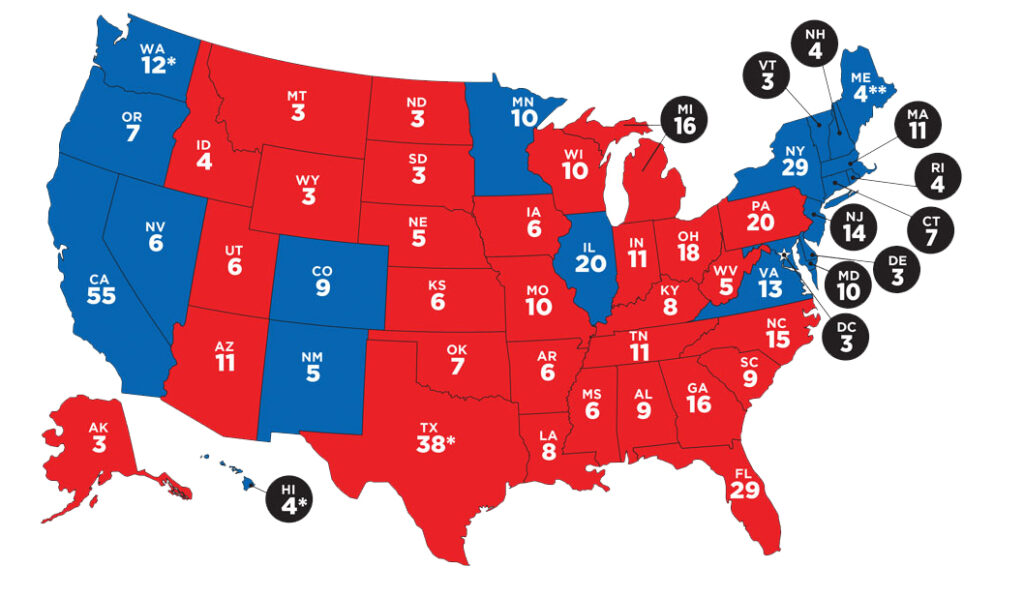The Electoral College has been a huge debate topic among politics since Trump’s 2016 win, making many VanCougs question, will your vote make a difference in the 2020 election?

(Photo courtesy of Mark Stephan)
The Electoral College, a constitutionally mandated process, is used to elect the president and vice president of the United States. Each state votes for its electors, and the electors then vote for the president. Some argue the Electoral College takes away from individuals and their votes, while others believe the Electoral College is beneficial in how it favors states as a whole over individual voters.
Paul Thiers, an associate professor of political science and public affairs at WSU Vancouver, shed light on how the number of electors per state is determined.
“The Electoral College is a way for the will of states to be used to elect the president and vice president. So each state gets the number of electors that is equal to its number of members of the House of Representatives, plus the two members of the Senate, and those are its electoral votes which that state can cast to elect the president,” Thiers said.
Typically, electors vote in favor of the state they are representing. However, this does not always happen. The Supreme Court unanimously claimed this year that states do have the power to control who their electors vote for according to NPR.
To complicate the process further, most states also adopt a winner take all system, where all of the electoral votes for a state are given to the candidate who gets the most electoral votes in that state. Thiers explained there are 51 separate elections for the president, as 50 states, including the District of Columbia, all get their own vote within the Electoral College. Aside from two states, Nebraska and Maine, all electoral votes are given to whoever wins the popular vote in the state.
Professor Mark Stephan, an associate professor in political science, also elaborated on how the winner take all system can lead to situations like the 2016 election, where battleground or swing states determine the outcome.
“Other states are evenly divided between [the two parties], and that is really where the competition happens. So that is why they are called battleground states. … It is not clear who is going to win that state and they are going to decide the election based on that. But take away the Electoral College, [and] it is wherever you can get votes. In a sense, every single vote matters across the country,” Stephan said.

Arguments against the Electoral College include the proposal that it delegitimizes elections, and makes people feel like their votes do not matter. This argument is typically supported by the fact that three elections in recent history had outcomes where the winner of the popular vote was not the winner of the election.
“John F. Kennedy, George W. Bush and Donald Trump were all elected, even though they got less votes in the popular vote than their opponents. I think that what those elections make clear, is that the electoral college delegitimizes those elections. That is not the primary factor, but it is a factor in the decline in support for democracy generally, in the United States,” Thiers said. Sharing his opinion, Professor Stephan believes the Electoral College does not have a place in today’s U.S. government.
“I actually think [the Electoral College] does not have any benefit. I think it should be gone, because I think the Electoral College is too messed up in terms of how it is structured,” Stephan said.
According to Professor Thiers, it is likely the Electoral College will soon be abolished, but it will not go away so soon, without a fight.
“There is a strong movement to try and make the electoral college irrelevant,” Thiers said. “I think that the more likely pathway is to actually have a constitutional amendment to abolish the Electoral College, but that will be difficult because small states will fight it.”
Caressa Milgrove, a senior public affairs major, believes the Electoral College takes away the voice of the people.
“The people have had such a small voice in comparison to the rhetoric that we are taught as having this thriving democracy. It is the image of one, we get to vote, but how much our vote counts, that is the question,” Milgrove said.
No matter how you plan to vote in this year’s presidential election, familiarizing yourself with the election process can be beneficial. Should we keep the Electoral College? Has it done the American people a favor? That is up to the voters to decide.
